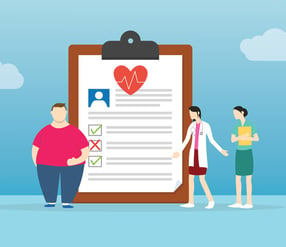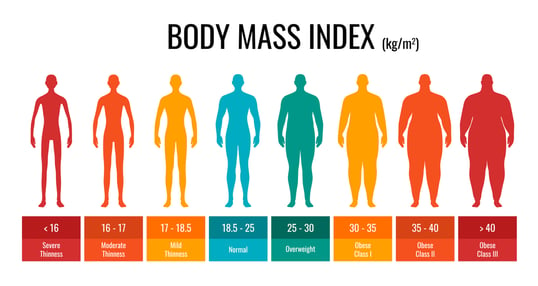Is Being Overweight Really That Bad for My Heart?
 If you are one of the 42.4% of Americans living with obesity, you have likely been told by a healthcare provider that if you don’t lose weight, you are putting your heart at significant risk.
If you are one of the 42.4% of Americans living with obesity, you have likely been told by a healthcare provider that if you don’t lose weight, you are putting your heart at significant risk.
If you are someone who does not smoke, drink excessive amounts of alcohol, or partake in other negative health behaviors, it can be easy to think well if I’m just overweight, how bad can that really be for my heart?
The reality is that obesity puts you at a significantly higher risk for heart disease, even without other risk factors.
I Know I'm Overweight, But Does That Mean I'm Obese?
-
- The Body Mass Index score is a tool used by healthcare providers to help determine if your weight is within a healthy range. You are considered obese if your BMI is greater than or equal to 30. If you do not know your BMI, there are many calculators available online, such as this one on the Centers for Disease Control and Prevention website.

My BMI Show That I Am Obese, How Does That Affect My Risk of Heart Disease?
- Adults who are overweight and obese have a higher risk of developing heart disease and of developing it at a younger age than adults with a healthy weight.
- Due to the increased risk of heart disease, adults with obesity have a shorter overall life expectancy.
- If you have the time, this documentary about comedian and actor Frank Payne is an excellent look at how an excess of fat affects the body.
Obesity Has Many Harmful Effects on the Body. It Plays a Significant Role in the Development of Three Conditions Which Lead to Heart Disease:
- Increased Cholesterol Levels
- Obesity is associated with increased levels of “bad” cholesterol and decreased levels of “good” cholesterol. Increased cholesterol levels can lead to dangerous plaque buildup in crucial blood vessels and of fat around the heart itself.
- High Blood Pressure (Hypertension)
- A larger body needs a larger amount of oxygen and nutrients, meaning your heart has to pump a greater amount of blood. Additionally, the extra fat and body mass mean your heart has to work harder to push that blood through your vessels, increasing your blood pressure.
- Dr. John Pilcher, a bariatric surgeon, discusses how obesity increases the amount of work required by the heart in this educational video. Or as he puts it, “a half-ton truck hauling a one-ton load… that little motor can pull that load for a little bit but it is going to break after a while.” He points out that the heart is a muscle and that it can keep up with the increased demand for 5, 10, or even 20 years, but eventually, like any muscle, it gets tired and begins to fail.
- Type 2 Diabetes
- Diabetes significantly increases your risk of having and of dying from heart disease.
I Try to Lose Weight By Eating Healthier and Exercising But Nothing Seems to Work.
- Obesity is a complex disease with many possible causes. As such, there is no one treatment that is right for every person. In this video, Dr. Fatima Cody Stanford discusses the causes, diagnoses, and possible treatment options of obesity. Dr. Stanford highlights the benefits of weight loss surgery. While bariatric surgery is an effective option, it is only available for a small portion of people with obesity.
Clinical Trials
At Chase Medical Research, we have more than 25 years of experience investigating medications for obesity. You can check out what trials we have enrolling here, or you can call 203-419-4404 today to speak with our trained, compassionate staff to see if one of our studies is right for you.
References:
- Cover Story | Obesity and Cardiovascular Disease Risk - American College of Cardiology. (2018, July 6). American College of Cardiology. https://www.acc.org/latest-in-cardiology/articles/2018/07/06/12/42/cover-story-obesity-and-cardiovascular-disease-risk
- Khan, S. S., Ning, H., Wilkins, J. W., Allen, N. B., Carnethon, M. R., Berry, J. D., Sweis, R., & Lloyd-Jones, D. M. (2018). Association of Body Mass Index With Lifetime Risk of Cardiovascular Disease and Compression of Morbidity. JAMA Cardiology, 3(4), 280. https://doi.org/10.1001/jamacardio.2018.0022
- Lopez-Jimenez, F., Almahmeed, W., Bays, H., Cuevas, A., Di Angelantonio, E., Roux, C. W. L., Sattar, N., Sun, M. C., Wittert, G., Pinto, F. J., & Wilding, J. P. (2022). Obesity and cardiovascular disease: mechanistic insights and management strategies. A joint position paper by the World Heart Federation and World Obesity Federation. European Journal of Preventive Cardiology, 29(17), 2218–2237. https://doi.org/10.1093/eurjpc/zwac187
- Overweight & Obesity Statistics. (2022). National Institute of Diabetes and Digestive and Kidney Diseases. https://www.niddk.nih.gov/health-information/health-statistics/overweight-obesity
- Powell-Wiley, T. M., Poirier, P., Burke, L. E., Després, J., Gordon-Larsen, P., Lavie, C. J., Lear, S. A., Ndumele, C. E., Neeland, I. J., Sanders, P., & St-Onge, M. (2021). Obesity and Cardiovascular Disease: A Scientific Statement From the American Heart Association. Circulation, 143(21). https://doi.org/10.1161/cir.0000000000000973
- World Health Organization: WHO. (2019). Cardiovascular diseases. www.who.int. https://www.who.int/health-topics/cardiovascular-diseases#tab=tab_1
Share This Post
Recent Posts
- The Relationship Between Obesity and Obstructive Sleep Apnea May 12 2023
- Cardiovascular Outcome Clinical Trials May 12 2023
- Diabetic Peripheral Neuropathic Pain May 12 2023
- Are All Types of Cholesterol Bad? May 12 2023
- Blood Pressure: The Highs, the Lows, and Everything in Between May 12 2023
Categories
- Clinical Trials
- Cardiovascular Disease
- Diabetes
- Obesity
- Kidney Disease
- Hypertension
- Pain Management
- Vaccine
- Cholesterol
- Chronic Obstructive Pulmonary Disease
- Diabetic Peripheral Neuropathy
- Migraine
- Osteoarthritis
- Biologics
- COVID-19
- Gastroesophageal Reflux Disease
- Irritable Bowel Syndrome with Constipation
- Lyme Disease
- Nonalcoholic Steatohepatitis
- Respiratory Syncytial Virus



